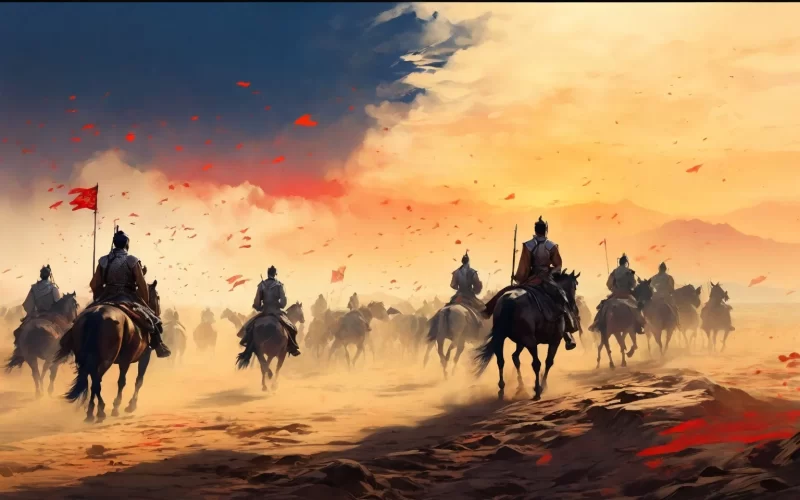Last year you went with your troops to Tibet;
And when your men had vanished beyond the city-wall,
News was cut off between the two worlds
As between the living and the dead.
No one has come upon a faithful horse guarding
A crumpled tent or torn flag, or any trace of you.
If only I knew, I might serve you in the temple,
Instead of these tears toward the far sky.
Original Poem
「没蕃故人」
前年戍月支,城下没全师。
蕃汉断消息,死生长别离。
无人收废帐,归马识残旗。
欲祭疑君在,天涯哭此时。
Interpretation
Composed during the Tang Dynasty's era of relentless frontier warfare, this poem mourns a dear comrade presumed lost in the protracted conflicts against Tibet. Zhang Ji's elegy gives voice to profound grief while delivering a silent indictment of war's brutality—where soldiers vanish without trace, leaving loved ones suspended between hope and despair.
First Couplet: « 前年戍月支,城下没全师。 »
Qiánnián shù Yuèzhī, chéng xià mò quán shī.
Two years past, you garrisoned Yuezhi's frontier— Beneath those walls, the entire force was lost.
The opening delivers a devastating military report in twelve stark syllables. The verb "was lost" (没) carries the weight of irreversible annihilation, its monosyllabic finality echoing the abruptness of battlefield death.
Second Couplet: « 蕃汉断消息,死生长别离。 »
Fān Hàn duàn xiāoxi, sǐ shēng cháng biélí.
Tibetan and Han communications severed— This separation spans the realms of death and life.
Here, geopolitical rupture ("communications severed") becomes personal limbo. The phrase "spans the realms" crystallizes the survivor's torment—neither mourning nor moving on is possible in this informational void.
Third Couplet: « 无人收废帐,归马识残旗。 »
Wú rén shōu fèi zhàng, guī mǎ shí cán qí.
No one gathers the abandoned tents, Yet homecoming steeds still know the tattered standard.
The battlefield tableau achieves tragic irony through the horses' loyalty. These "homecoming steeds" serve as mute witnesses to human absence, their recognition of the "tattered standard" underscoring the army's irreversible dissolution.
Fourth Couplet: « 欲祭疑君在,天涯哭此时。 »
Yù jì yí jūn zài, tiānyá kū cǐ shí.
I prepare rites, yet doubt you live— Facing the distant frontier, I weep into the void.
The emotional climax resides in ritual paralysis. The speaker's inability to perform memorial rites—haunted by possibility—transforms grief into existential cry against war's cruel ambiguities.
Holistic Appreciation
This elegiac poem, structured around mourning a fallen comrade, meticulously develops its central theme of "ambiguous death in battle." From wartime context to emotional turmoil, it progressively unveils war's profound suffering and loss. The concluding line—"I prepare offerings, yet doubt you survive"—masterfully captures that excruciating tension between accepting mortality and relinquishing hope. Though emotionally restrained, the poem resonates with devastating intensity through its distilled language and desolate imagery, standing as a masterpiece of sorrow among Tang dynasty frontier poetry.
Artistic Merits
The poem's six lines form a tightly constructed emotional arc, with each couplet marking an intensifying stage: from military defeat to severed communication, then to battlefield remnants and psychological conflict, culminating in the devastating "weeping at this moment." Concrete yet symbolic imagery—"abandoned tents," "tattered banners," "homeward-bound horse"—vividly recreates the war's devastation while reflecting the poet's profound meditation on conflict. The line "the returning horse recognizes broken flags" proves particularly poignant, using the horse's emotional memory to underscore human irrevocable loss.
Insights
In this poem, Zhang Ji, writing as an ordinary scholar, channels profound reflections on the brutality of war and a poignant appeal for human compassion. The verses inspire us in this era of peace to cherish our hard-won stability while recognizing the countless shattered families behind every conflict. The emotional struggle between clinging to hope and accepting loss when facing missing loved ones represents one of humanity's most complex yet authentic experiences. Life's impermanence makes bonds of loyalty all the more precious, and our remembrance of departed friends becomes an enduring tribute to memory, fidelity, and humanitarian spirit that transcends generations.
Poem translator
Kiang Kanghu
Zhang Ji (张籍, c. 767 - c. 830 A.D.) was a poet of the Tang Dynasty, a Han Chinese, and a native of Wujiang, Hezhou (present-day He County, Anhui Province, China).












